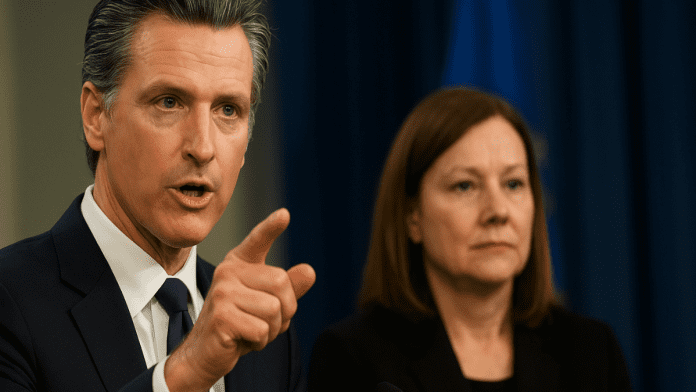🕒 Last updated on September 27, 2025
California is locked in a heated battle with the federal government over clean air rules, electric vehicle funding, and rebate programs.
A Shift in the Debate
Governor Gavin Newsom has often focused his sharp words on national political leaders, blaming them for roadblocks that threaten California’s climate goals. But last week, his focus shifted.
When asked about the state’s own support for electric vehicle buyers, Newsom did not talk about California’s expired rebate program. Instead, he turned his attention toward carmakers, and one executive in particular. His remarks sparked attention because they made a business leader, rather than just politicians, the target of blame.
The governor said that automobile companies had sided with federal rollbacks of California’s right to set its own tailpipe emission rules. He placed much of the responsibility on General Motors, suggesting that the company had helped undo decades of clean air progress.
This marked a rare moment when the state leader pointed a finger at industry leaders instead of solely at Washington. His choice of words added drama to a fight that already involves court battles, expired rebates, and billions of dollars at stake for automakers and consumers.
Newsom strikes climate deal with Brazil after Trump calls climate change a con job
GM’s Role Under the Spotlight
General Motors has found itself at the center of controversy for its recent decisions. Earlier this month, the company announced it would stop making its electric Cadillac model. The firm also dismissed the value of the $7,500 federal rebate that helps many families afford electric cars, calling the incentive “irrational.”
That announcement was surprising to many. Only a few years ago, the company had promised to eliminate tailpipe pollution from new light-duty vehicles by 2035. It also pledged to reach carbon neutrality across its operations and products by 2040. The change in tone has raised questions about its long-term commitment to clean transportation.
Adding to the tension, the company scaled back its investments in a driverless electric taxi project once based in San Francisco. For a state that has built much of its climate identity on being a leader in clean technology, this retreat from electric innovation struck a nerve.
The relationship between General Motors and the federal government has also shifted over time. In earlier years, the company and national leaders clashed over plant closures and production decisions. But more recently, the tone has softened, with the company signaling that it shares common goals with the administration. While tariffs and trade disputes have threatened to cost the company billions, it has chosen cooperation over open criticism.
This cooperation has fueled the idea that the automaker may be more aligned with federal rollbacks than with California’s stricter standards. That perception gave Newsom an opening to frame the company as siding against the state’s clean air efforts.
California’s Missing Rebates
The debate over carmakers and clean air rules might distract from another issue: California’s own electric vehicle rebate program. For years, the state offered buyers up to $7,500 to help make electric cars more affordable. That program ended two years ago, and despite promises, it has not returned.
Brazil draws red line — Lula declares nations will not bow to Trump’s economic threats
After the last national election, the governor pledged that California would step in with state rebates if the federal program was cut. Now, with the federal rebate set to expire next week, the state has not revived its own incentive. Families looking to buy an electric car may soon find themselves without support from either Washington or Sacramento.
Why did California let its rebate program lapse? The answer lies in the state’s budget. With revenues shrinking and billions needed for wildfire recovery and rebuilding, the government chose to use funds from its Cap-and-Trade program elsewhere. Climate goals remained important, but competing demands on the budget left fewer resources for rebates.
Whether the actions of carmakers influenced this choice is not clear. What is certain is that the absence of rebates adds pressure to the already heated debate. Automakers, federal leaders, and state officials are all pointing fingers, but consumers may be the ones caught in the middle.

